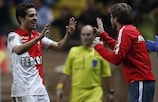Wenger on Arsenal, Henry and a Monaco reunion
Sunday, February 22, 2015
Article summary
As Arsène Wenger prepares for a meeting between two clubs that have been his life for 25 years, he discusses his time at AS Monaco FC, Thierry Henry and Arsenal FC's quarter-final aim.
Article top media content

Article body
UEFA.com: How did you feel when Monaco were pulled out of the hat at the draw?
Arsène Wenger: To be honest it was a surprise, because I always expect the most prestigious team to come out against us – that has happened the last five or six years. It's also one of those strange coincidences in life, because between them these two clubs account for 25 years of my life. That's very unusual, to meet in the Champions League. It was a little bit of an emotional shock.
UEFA.com: You finished second in your group again. After the previous four seasons and the setbacks you have had at this stage, was that a concern?
Wenger: It was, yes! We were always in difficult groups, and this year we were level on points with Dortmund but finished second in the group. It was a big concern, because we [previously] got Bayern, Barcelona, AC Milan, with the second game obviously away. But this time I think it's 50-50 and that means we have a chance. It will be down to the quality of our performance.
UEFA.com: We all know about Arsenal's attacking qualities, while Monaco conceded only once in the group stage; how do you see the first leg in north London?
Wenger: When the first game is at home, you play with the desire to score but know that every goal you concede can be deadly. You must find a balance between free-spirited attacking and being cautious enough to defend well – that will be down to experience. We have experience in this competition; this is a good opportunity to show it.
UEFA.com: At Monaco you promoted young players and had them playing attractive football, and at Arsenal you have done the same. Are you proud to have made that mark on both clubs?
Wenger: Yes, I am very proud of having achieved that because I have the good fortune to be in a job where I can influence people's lives in a positive way. What's strange for me is that the guys I helped at the start of their careers, like [Lilian] Thuram, [Emmanuel] Petit, have already finished their careers. You are always happy when they have fantastic careers; helping players achieve something in life provides a very positive feeling.
UEFA.com: Looking back to some of your adventures with Monaco, what do you feel when you recall the 1992 European Cup Winners' Cup final against Werder Bremen?
Wenger: Sadness. The night before, in France, we had a huge disaster in Bastia [18 died when a stand collapsed ahead of a French Cup semi-final], and we couldn't go to bed after that, and we couldn't prepare properly for the game. It was a bit similar to the [2006] Champions League final, because we didn't lose a game all season, just the final.
But when I arrived in Monaco, the club had never gone further than the first round, so the fact that we played a Cup Winners' Cup final, the fact we played in a Champions League semi-final, that we went far in UEFA Cups, was an achievement. They reached the Champions League final, too, after I left.
UEFA.com: Regarding that run to the 1994 UEFA Champions League semi-finals with such a talented team and some big names, how much did you enjoy that time and what lessons did you learn?
Wenger: It was very important for me. We were in a group with Barcelona; we played AC Milan, the big team at the time. It was a very interesting experience. Since then, of course, I have had over 180 games in the Champions League, but you never get used to playing in the Champions League because it's always a privilege to play against the best teams in Europe.
UEFA.com: One man associated with both Arsenal and Monaco is Thierry Henry. What made him stand out when he was a teenager in France?
Wenger: He had exceptional technical qualities, a good understanding of the game and was a super athlete too. And his pace, his power, was frightening: he had it all. He was 17 when I gave him his first start and I could see something special. He was a world champion at 19 and enjoyed such a huge career, even if he had a difficult period when he went to Italy. He came here [to Arsenal] at the age of 21 and he quickly became the superstar he deserved to be.






